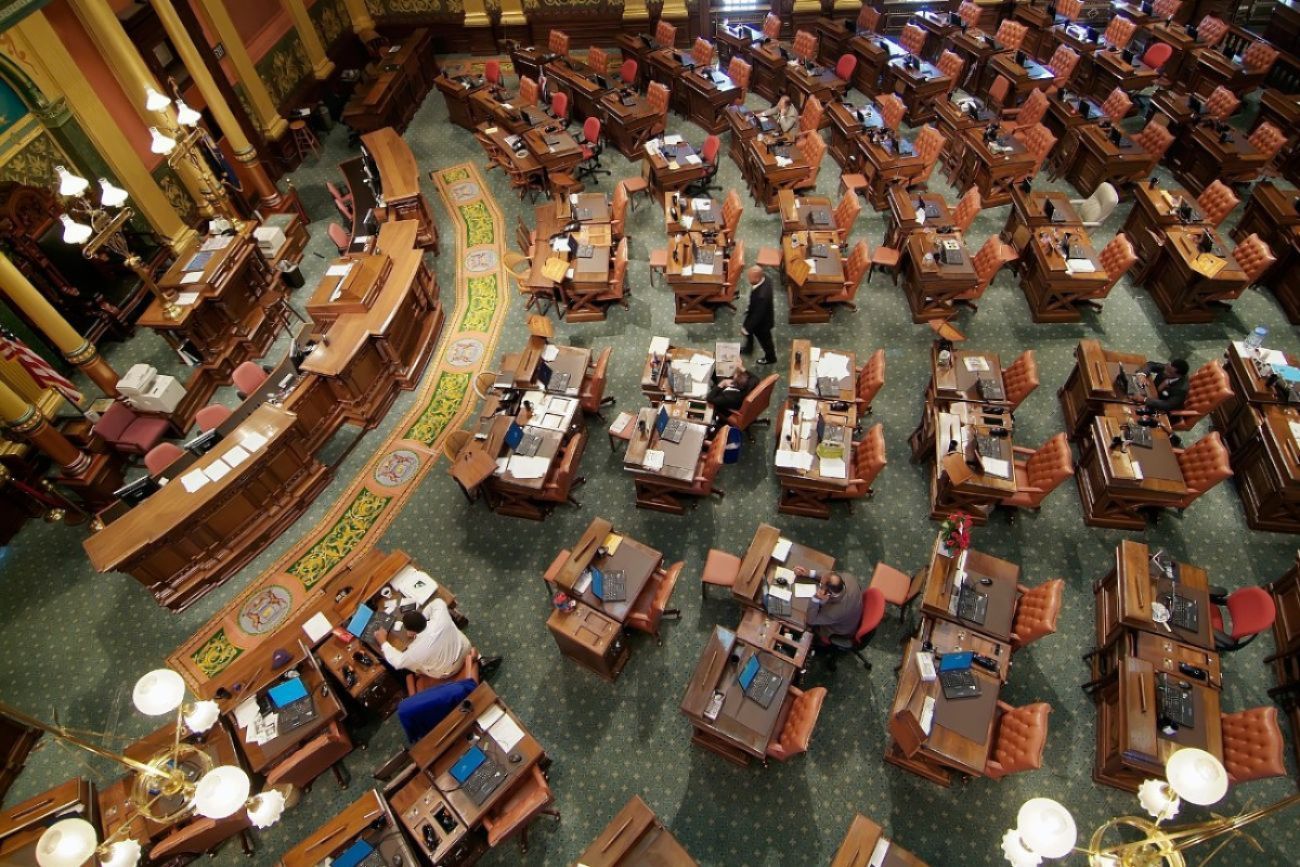Michigan House majority is on the line. These districts will decide it

- Democrats currently hold a two-seat majority in the Michigan House, but Republicans see pickup opportunities in close races
- As of mid-October, spending in 13 races has topped $1 million, with eight costing more than $2 million
- Districts in southeast, west, central and northern Michigan are in play: “The battleground is basically all across the state”
In the fight for control of Michigan’s state House, it all comes down to two seats.
Democrats wrested control of the chamber from Republicans two years ago, winning a 56-54 majority in a favorable environment that saw Gov. Gretchen Whitmer and other Democratic candidates sweep statewide seats.
With a much closer presidential race expected at the top of the ticket this year, Republicans are optimistic they can flip the House and end a political trifecta for Democrats, who also have a narrow majority in the state Senate.
Democrats are spending eye-popping amounts of cash to keep the majority, outspending Republican rivals at a near four-to-one ratio. As of mid-October, Democratic state House candidates had pumped $5.9 million into advertising and other expenses, compared to less than $1.6 million for Republicans.
Thirteen state House races have surpassed $1 million in spending between candidate funding, caucus PACs and outside groups. Eight races have cost at least $2 million, and two are above $3 million, on track to smash previous spending records for state House candidates.
Democrats view the cost of keeping the House a worthy investment, pointing to the flurry of activity in 2023 where the new majority passed sweeping LGBT rights, abortion and gun reforms while repealing Republican laws like Right-to-Work.
Whether they can hold the House is “too close to call,” said Jeremy Jansen, political director for the Democratic Legislative Campaign Committee.
“With a single seat, Republicans could bring this chamber back to a tie, and with two seats, they could flip it,” he said. “The battleground is basically all across the state.”
Democratic candidates in competitive seats have been hammering Republicans on their abortion stances, seeking to capitalize on voters’ past support of 2022’s Proposal 3, which added reproductive rights to the state constitution.
Republicans know they’re being outspent and have an uphill battle, but they’re working hard to capitalize on opportunities and feel good about their chances in a presidential year with former President Donald Trump at the top of the ticket.
“We understand that while the environment is better for Republicans this year, the degree of difficulty is higher — it is harder to beat incumbents,” said Rep. Bill G. Schuette, campaign chair for the House GOP caucus.
All 110 state House seats are up for grabs this cycle, but the vast majority of resources and attention have focused on roughly a dozen seats in the most politically competitive regions of the state.
Below are the races worth watching on Election Day as both parties battle for majority control.

Downriver brawl
When it comes to competitive state House races, all eyes are on Downriver’s 27th District, where incumbent Rep. Jaime Churches, D-Wyandotte, is facing a spirited challenge from Wyandotte Republican Rylee Linting.
A majority of voters in the district picked Trump in the last two presidential contests, though Whitmer won it during her second gubernatorial run in 2022, when Churches eked out a 660-vote win in her first bid for office.
It’s been the most expensive state House race of the cycle by far, with combined candidate contributions, caucus PAC spending and reported outside contributions topping $3.8 million. Churches and Democratic supporters have spent over $2 million, while Linting and her backers spent more than $1.7 million.
Churches, a former schoolteacher, has highlighted her work in the Legislature to secure free breakfast and lunch for K-12 students and stricter gun rights. During a recent roundtable in Woodhaven, she said she was initially told not to “broadcast it so loudly” when it came to her support of gun reforms — she rejected that advice based on her experiences as an educator.
After the shooting at Oxford High School, “my kids sat in my circle and they asked me, ‘What do I do if the shooter kills you?’” Churches said. “We made legislation so that teachers don’t have to answer those hard questions, because we’re working on systemic change.”
She told reporters she is feeling good about her chances and is “showing up every day” to knock doors, engage with constituents and share her message.
Linting, the Republican challenger, is a 22-year-old Grand Valley State University graduate and the youth vice chair for the Michigan Republican Party.
On her campaign website, Linting said she was inspired to get into politics after facing “indoctrination, vaccination mandates and woke student culture” and said her goal is to ensure future generations have the same opportunities as her parents did.
If elected, Linting’s priorities include lowering taxes and reducing rules and regulations on businesses while bringing a young, conservative voice to Lansing.
Elsewhere in Southeast Michigan, Democratic incumbent Reggie Miller of Van Buren Township is defending her seat in the 31st District against Raisinville Township Republican Dale Biniecki, and Brownstown Township Democrat Janise O’Neil Robinson is challenging incumbent Rep. Jamie Thompson, R-Brownstown Township, in the 28th District covering portions of Downriver and Monroe County.
Democrats have vastly outspent Republicans in the 31st, which covers portions of Lenawee, Monroe, Washtenaw and Wayne counties. Democratic presidential candidates eked out a win there in 2016 and 2020. In the 28th, spending for both candidates topped $1.2 million, though it would likely be an uphill battle for Democrats in a region Trump won in 2020.

Jackson seat up for grabs
Rep Kathy Schmaltz, R-Jackson, cruised to victory in the 46th District after Democratic opponent Maurice Imhoff dropped out, then restarted his campaign amid controversy over threatening social media posts he made in high school.
She has a far tougher race this cycle — her opponent is Jackson Mayor Daniel Mahoney, a former county commissioner and the city’s first Black mayor.
On paper, the 46th District, which covers the city of Jackson and portions of Washtenaw County, is a near 50-50 draw for Democrats and Republicans, meaning what happens at the top of the ticket could play the deciding role in how either candidate fares there.
Mahoney told Fox 47 News his top priorities include roads and infrastructure, keeping the community safe and improving educational outcomes, pointing to his track record of public service on the county commission and as mayor.
“Over the last 10 years, I have been doing the work, and I have shown that I can get results," he told the station.
Schmaltz, a former news anchor, said she’s not a career politician and is in the business to “make life easier for people.” She said she’s working hard to defend her seat and is confident a majority of voters will back the work she’s been doing.
“It's a tough district…but again, I think most people realize why I'm doing this,” she said. “We don’t let up. We just keep working.”

Macomb’s political shift
The Macomb County-based 58th District will test the power of incumbency against rapidly shifting political winds.
Republican Ron Robinson, a Utica city council member and U.S. Marine Corps veteran, is challenging incumbent Rep. Nate Shannon, D-Sterling Heights, in a district that's been favorable to Trump in recent election cycles.
Shannon, a former teacher and city council member, has won re-election three times and is going for a fourth term this fall. In 2020, Shannon defeated his Republican opponent in a district that Trump won by 6 points (district lines have since changed after being redrawn during the redistricting process).
It was the third costliest district as of mid-October, with pro-Shannon spending nearing $1.7 million and pro-Robinson spending at roughly $1.8 million.
Democrats are also spending heavily in the 61st District currently held by Rep. Denise Mentzer, D-Mt. Clemens, another district held by Democrats where Trump has previously performed well. She’s facing Robert Wojtowicz, a Mt. Clemens Republican and Chippewa Valley School District trustee.
Another race to keep tabs on in Macomb: the Warren-based 13th District seat currently held by Rep. Mai Xiong, D-Warren.
Xiong, a former Macomb County Commissioner, has been in office less than a year after winning a special election to replace Lori Stone, and the district has since been redrawn. Trump only narrowly lost this region in 2016 and 2020, and Republicans believe challenger Ron Singer has a shot.

Oakland in play
Michigan’s second-largest county has been trending Democratic in recent election cycles as suburban voters shift away from Trump.
Republicans have retained a foothold in northern reaches of the county, though Democrats have poured substantial resources into expanding their advantage there and are eyeing the 54th District held by Rep. Donni Steele, R- Orion Township, and the 55th District held by Rep. Mark Tisdel, R-Rochester Hills.
Both Steele and Tisdel have an incumbency advantage and are well known locally for their past local government work — Steele as an Orion Township trustee and treasurer and Tisdel as a Rochester Hills council member.
But their districts have been trending towards Democrats. Trump’s support in the Oakland County suburbs eroded between 2016 and 2020, when Biden expanded on leads in communities like Novi and Bloomfield Township that went to Hillary Clinton in 2016 and brought some conservative areas into closer margins.
Related:
- Michigan House battle spurs big spending as Democrats defend slim majority
- Trans rights fight returns as wedge in Michigan elections
- Why Michigan election results won't be immediate. And why it’s not a conspiracy
A majority of voters in Rochester Hills supported Tisdel in 2020 but backed Biden and Democratic U.S. Rep. Elissa Slotkin. In 2024, he’s facing a challenge from Rochester Democrat Trevis Harrold, a former foreign service officer and an officer in the U.S. Army Reserve.
Political parties and PACs have spent over $2 million in the 55th and more than $1 million so far in the 54th. Democrats recently shifted more money into the 54th to support Bloomfield Hills Democrat Shadia Martini, the candidate challenging Steele.
Martini, a business owner and Syrian immigrant, said her main goal is to prevent Michigan from turning into anything similar to the dictatorship she grew up under, and she wants to help improve the economy for everyone and protect women's rights because “we are not in the Middle Ages anymore.”
Which party controls the majority “100 percent” comes down to whether Democrats see success in Oakland County, Martini said: “Unfortunately we have a few current representatives that are in danger, so we have to pick up some seats. Otherwise, we’re doomed.”
For Steele, the election is in many ways a distraction from the policy goals she'd like to accomplish, like fixing the roads, improving public safety and making state government more efficient and transparent.
“Politics has gotten in the way of what this government was designed to do to begin with,” she said. “People are tired of us at their front door. They're tired of the mail, they're tired of the commercials, and all they see is hate and vitriol.”
Another Oakland County race to keep on the radar is the 56th District, where incumbent Rep. Tom Kuhn, R-Troy, is facing a challenge from Sterling Heights Democrat Aisha Farooqi, a Wayne County assistant prosecuting attorney. Spending there hasn’t matched the ferocity of other competitive Oakland County contests.

Up North battlegrounds
The 103rd District covering Leelanau County and portions of Grand Traverse and Benzie counties is a near 50-50 split, and Rep. Betsy Coffia’s victory there in 2022 played a key role in flipping the Democratic majority.
Coffia, a Traverse City Democrat and former county commissioner, is being challenged by Traverse City Republican Lisa Trombley, a former government contractor.
As of mid-October, the race was the second most expensive statewide, with spending topping $3 million across both parties. Between candidate and party PACs, spending supporting Coffia’s campaign was just under $1.6 million, while spending for Trombley was close behind at $1.4 million.
Democrats acknowledge this is a tough district, but they feel good about their chances to re-elect Coffia: The region, once solidly red, has been trending blue in recent election cycles.
Further north, the Marquette-based 109th district in the Upper Peninsula is coming down to the wire, with first-term incumbent Rep. Jenn Hill, D-Marquette, defending her seat against Republican Karl Bohnak, a well-known former meteorologist with Marquette’s LWUC-TV6.
Marquette has long trended Democratic, but Republican-leaning outposts in the district and Bohnak’s name recognition make the 109th race one to watch.

Possible pickups in West Michigan
In Calhoun County, third-term incumbent Rep. Jim Haadsma, D-Battle Creek, is facing increasing pressure from Republicans who hope to capitalize on a region Trump narrowly won in 2016 and 2020.
Haadsma, an attorney seeking a fourth term in office, is facing a tough challenge from Battle Creek Republican Steve Frisbie, a paramedic and firefighter who serves on the Calhoun County Commission.
Total spending in this race so far is well over $2 million, and Republicans are bullish about their chances to flip the seat.
Elsewhere in West Michigan, former Republican state lawmaker Tommy Brann of Wyoming, newly freed by term limit changes, is running again in Kent County’s 83rd District covering the outskirts of Grand Rapids.
The seat is currently held by incumbent Rep. John Fitzgerald, D-Wyoming. The seat has trended Democratic in recent election cycles, but Brann is well-known as both a former lawmaker and local businessman.
In Southwest Michigan’s 38th District, Rep. Joey Andrews, D-St. Joseph, is facing a rematch with South Haven Republican Kevin Whiteford, an accountant and business owner.
See what new members are saying about why they donated to Bridge Michigan:
- “In order for this information to be accurate and unbiased it must be underwritten by its readers, not by special interests.” - Larry S.
- “Not many other media sources report on the topics Bridge does.” - Susan B.
- “Your journalism is outstanding and rare these days.” - Mark S.
If you want to ensure the future of nonpartisan, nonprofit Michigan journalism, please become a member today. You, too, will be asked why you donated and maybe we'll feature your quote next time!





